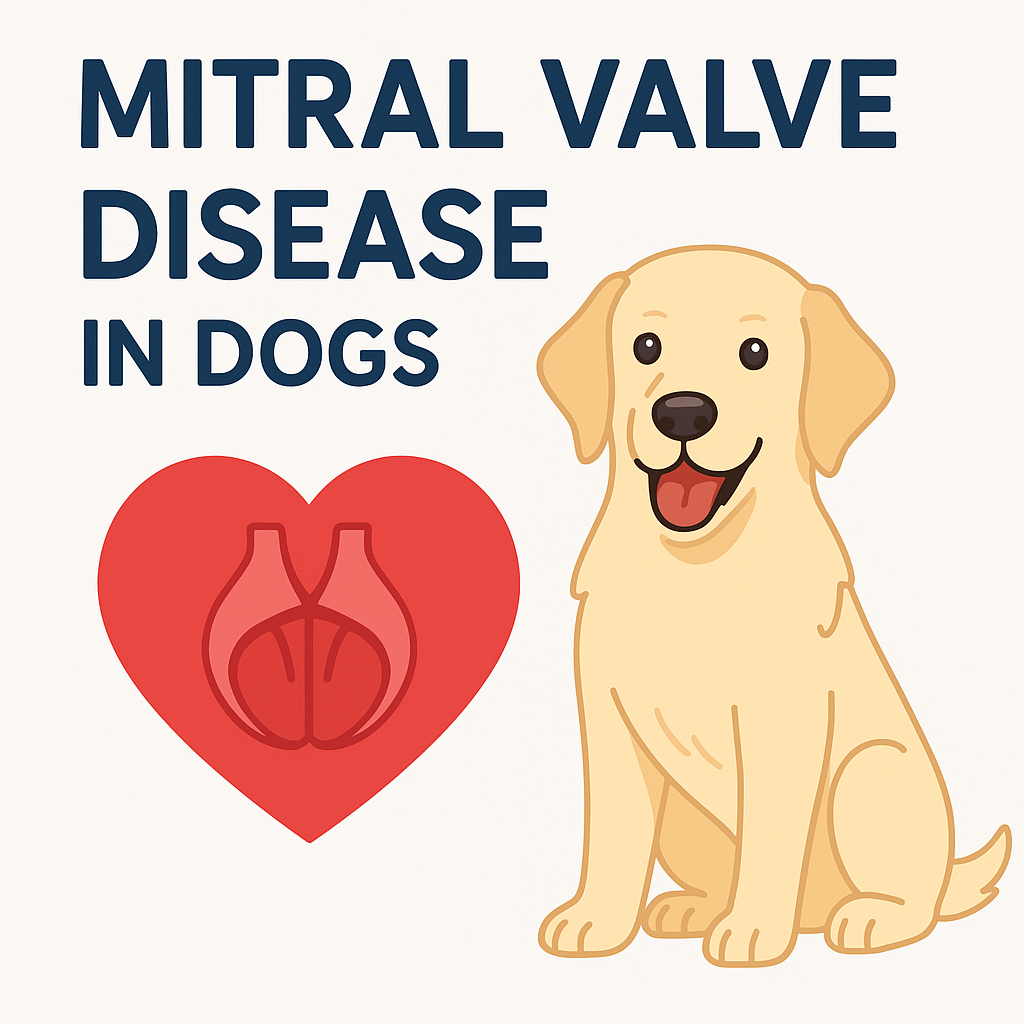
❤️ Mitral Valve Disease in Dogs – Symptoms, Causes, and Management Guide
Mitral Valve Disease in Dogs – Symptoms, Causes, and Management Guide
What Is Mitral Valve Disease in Dogs?
Mitral Valve Disease (MVD), also known as Mitral Valve Regurgitation,
is a condition where the mitral valve between the left atrium and left ventricle of a dog’s heart fails to function properly,
causing blood to flow backward (regurgitation).
It is particularly common in small and senior dogs.
In the early stages, there may be no obvious symptoms,
but as the disease progresses, it can lead to congestive heart failure.
Early detection and ongoing management are crucial to improving a dog's quality of life.
Symptoms of Mitral Valve Disease in Dogs (Focus Keyword)
-
Persistent coughing, especially at night
-
Difficulty breathing or labored breathing
-
Decreased stamina and easy fatigue
-
Loss of appetite and weight loss
-
Abdominal distension (due to fluid buildup)
-
Fainting episodes or general lethargy
➔ Symptoms worsen as heart function deteriorates.
Causes of Mitral Valve Disease in Dogs
-
Aging: Tissue weakening in older dogs increases the risk
-
Genetic predisposition: Common in Cavalier King Charles Spaniels, Poodles, Chihuahuas, and other small breeds
-
Obesity: Increases the workload on the heart
-
Chronic inflammation: Gum disease or chronic bronchitis can contribute indirectly
Stages of Mitral Valve Disease in Dogs
| Stage | Description |
|---|---|
| Stage B1 | Heart murmur detected, no structural changes |
| Stage B2 | Beginning of heart enlargement, mild symptoms |
| Stage C | Symptoms of congestive heart failure appear (coughing, breathing issues) |
| Stage D | End-stage heart failure, reduced medication responsiveness |
How to Manage Mitral Valve Disease in Dogs
1. Regular Heart Checkups
-
Early detection through auscultation, X-rays, and echocardiography
-
Checkups recommended every 6 to 12 months
2. Weight Management
-
Maintaining an ideal body weight reduces cardiac stress
3. Medications
-
Positive inotropes to improve heart contractions
-
Vasodilators to reduce cardiac workload
-
Diuretics to manage fluid retention
Accurate diagnosis and medication management under veterinary supervision are essential.
4. Exercise and Stress Management
-
Avoid strenuous activities
-
Create a stress-free living environment
5. Specialized Diet
-
Low-sodium diet to prevent fluid retention
-
Diets enriched with Omega-3 fatty acids and taurine to support heart health
Can Mitral Valve Disease in Dogs Be Cured?
Unfortunately, mitral valve disease is a progressive and incurable condition.
However, with early diagnosis, proper medical management, and lifestyle modifications,
dogs can live longer and enjoy a better quality of life.
🛒 Recommended Products for Supporting Heart Health
-
Low-sodium, heart-specific dog foods
-
Heart health supplements (Omega-3, Coenzyme Q10)
👉 Explore our Dog Heart Health Collection
External Resource (DoFollow)
For more detailed information, visit the American College of Veterinary Internal Medicine – Mitral Valve Disease in Dogs.
Internal Resource
👉 Related article: Patellar Luxation in Dogs – Symptoms and Management
🧩 Frequently Asked Questions (FAQ)
Q1. Can dogs with mitral valve disease exercise?
A1. Strenuous exercise should be avoided.
However, short walks and activities that reduce stress are encouraged, under veterinary guidance.
Q2. Will medication cure mitral valve disease in dogs?
A2. Medications help manage symptoms and slow progression,
but they cannot cure the disease. Lifelong management is necessary.
Q3. What foods are beneficial for dogs with heart disease?
A3. Diets that are low in sodium, high in quality protein, and rich in Omega-3 fatty acids can help support heart function.
🥗 Best Foods for Dogs with Mitral Valve Disease and Important Feeding Tips
Best Foods for Dogs with Mitral Valve Disease
Proper nutrition plays a crucial role in managing mitral valve disease in dogs and supporting heart function.
Here are the recommended food types:
-
Low-Sodium Diets:
Sodium restriction helps prevent fluid retention and reduces the burden on the heart.
Look for dog foods specifically labeled as "heart-healthy" or "low-sodium." -
High-Quality Proteins:
Choose foods rich in easily digestible proteins, such as chicken, turkey, or fish, to maintain muscle mass without overloading the heart. -
Omega-3 Fatty Acids:
Found in fish oils, Omega-3s have anti-inflammatory properties and help improve heart health.
Consider supplements with EPA and DHA. -
Taurine and L-Carnitine Supplements:
These amino acids support healthy cardiac function and may slow disease progression. -
Antioxidant-Rich Foods:
Blueberries, spinach, and sweet potatoes provide antioxidants that protect heart cells from damage.
Important Feeding Tips and Precautions
-
Avoid High-Salt Treats and Table Scraps:
Human foods and commercial treats often contain high levels of salt, which can worsen heart disease. -
Maintain Ideal Body Weight:
Overweight dogs place extra strain on the heart.
Adjust portion sizes carefully and monitor body condition regularly. -
Feed Smaller, More Frequent Meals:
Dividing the daily food intake into 2–3 smaller meals can help reduce the heart's workload compared to one large meal. -
Choose Vet-Recommended Diets:
Consult your veterinarian to select appropriate therapeutic diets tailored to your dog's specific heart condition. -
Monitor for Changes:
Watch for signs like increased coughing, decreased appetite, or weight gain, and adjust the diet as needed in consultation with your vet.

